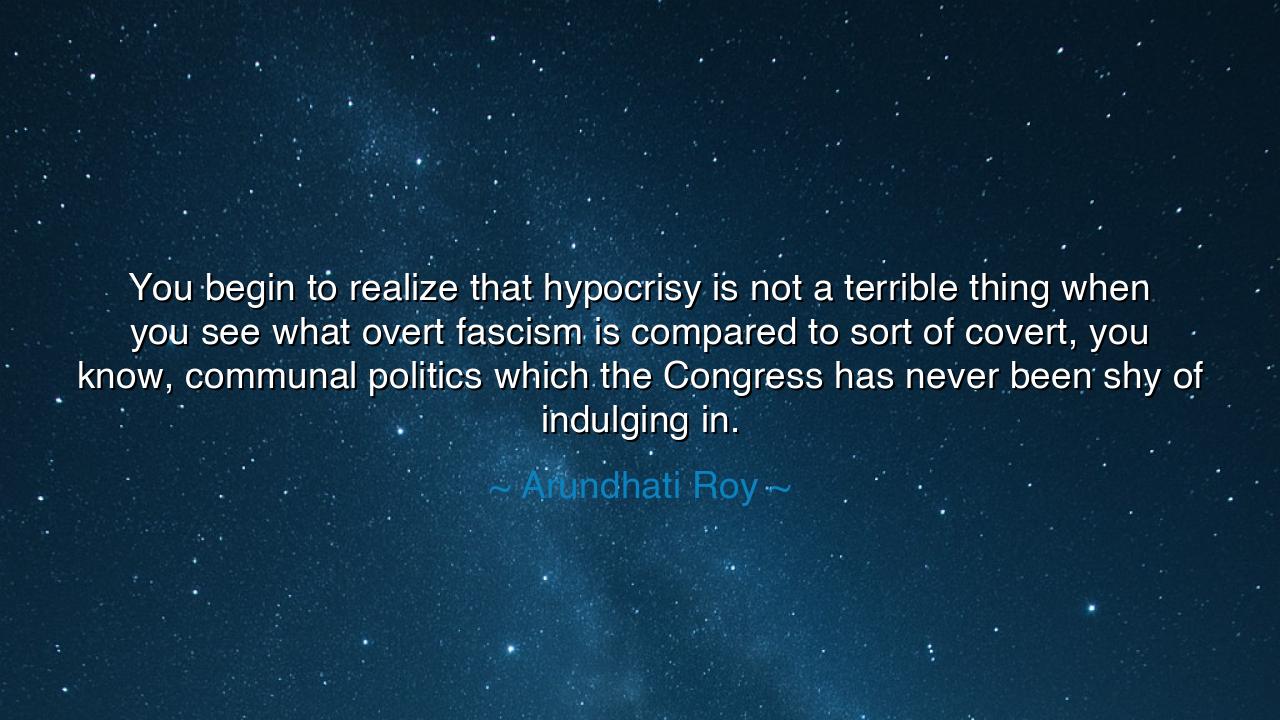
You begin to realize that hypocrisy is not a terrible thing when
You begin to realize that hypocrisy is not a terrible thing when you see what overt fascism is compared to sort of covert, you know, communal politics which the Congress has never been shy of indulging in.






When Arundhati Roy spoke, “You begin to realize that hypocrisy is not a terrible thing when you see what overt fascism is compared to sort of covert, you know, communal politics which the Congress has never been shy of indulging in,” her words burned with the fire of hard-won insight. She revealed that the evils of the world are not all equal; some are veiled in duplicity, while others stride forth naked, armed, and merciless. Hypocrisy, though corrosive, still cloaks itself in the language of morality. But fascism, unveiled and brutal, seeks to crush dissent, erase diversity, and enthrone fear as sovereign.
The ancients knew this truth well. They warned that even the mask of hypocrisy is sometimes a fragile shield, for it restrains the tyrant who still feels the need to pretend to virtue. But when the mask is cast aside and the tyrant embraces fascism, no limits remain; blood flows, and nations fall silent beneath the boot. Roy reminds us that in such moments, hypocrisy—though vile—appears almost gentle in comparison, for it still pays reluctant homage to the idea of justice.
She also unmasks the legacy of communal politics, the hidden poison that corrodes societies from within. When rulers divide people by faith or tribe for their gain, they sow seeds of mistrust that outlast empires. In India, the wounds of partition remain living scars, born of leaders who found it easier to fracture than to heal. The Congress, as Roy points out, was no stranger to such tactics, though cloaked in the garments of progress. It is a sobering reminder that even those who claim the mantle of democracy are not innocent of division.
Consider the fate of Germany in the 1930s. For years, its leaders cloaked prejudice in half-truths, their hypocrisy offering small restraints. But when Hitler rose with the banner of overt fascism, hypocrisy was abandoned, and terror ruled unashamed. In that descent, the world learned how much darker the abyss is when masks are thrown away.
Thus, Roy’s words call us to vigilance. Let not the people be lulled into believing that covert manipulation is harmless, nor let them forget the greater danger of open tyranny. Hypocrisy may be a sickness of the spirit, but fascism is its death. Better to struggle against the lies of the deceitful than to submit to the iron hand of those who no longer pretend. For once the mask of virtue falls, the struggle becomes not of politics, but of survival itself.






DSddd sss
I find Roy’s observation about hypocrisy and fascism quite unsettling. Should we be less concerned about hypocrisy if it is less harmful than overt forms of oppression? Is there ever a valid excuse for political dishonesty, or is this line of thinking too dangerous? When do we cross the line from tolerating small hypocrisies to allowing larger, more harmful ideologies to take root in our political systems?
MNLe Minh Nhat
Roy’s quote forces us to confront the uncomfortable reality that political systems, even in democracies, often thrive on hypocrisy or manipulation. But is it right to excuse these smaller transgressions because the alternative could be even worse? How do we hold politicians accountable for their actions without falling into a mindset that prioritizes fighting one extreme over the other? Can we truly navigate this by trying to find the lesser of two evils, or do we risk losing sight of what is right?
HMNguyen Thi Huong Mien
This quote by Arundhati Roy really makes me reflect on the dangers of normalizing any form of political manipulation, whether covert or overt. Is it fair to compare communal politics, which may be subtle or hidden, to the blatant authoritarianism of fascism? How do we ensure that smaller political hypocrisies don’t grow into larger, more dangerous systems of control? Should we be more vigilant about identifying the seeds of such behaviors in everyday politics?
THVuong Thu Hien
Roy’s comment is thought-provoking because it suggests that, in a way, we become desensitized to hypocrisy, especially when compared to something as overt and destructive as fascism. But does this mean that communal politics should be excused or overlooked? At what point does the line between ‘covert’ and ‘overt’ become too blurry to distinguish, and what happens when these practices become normalized in society?
UGUser Google
Roy’s statement raises an important point about the complexity of politics. Can we really equate covert communal politics with the overt violence of fascism? Is there ever a 'lesser evil' in politics, or should we be constantly striving for purity in leadership? How do we balance the harsh realities of political maneuvering with our ideals for a just and fair society, especially when different political parties engage in morally questionable tactics?